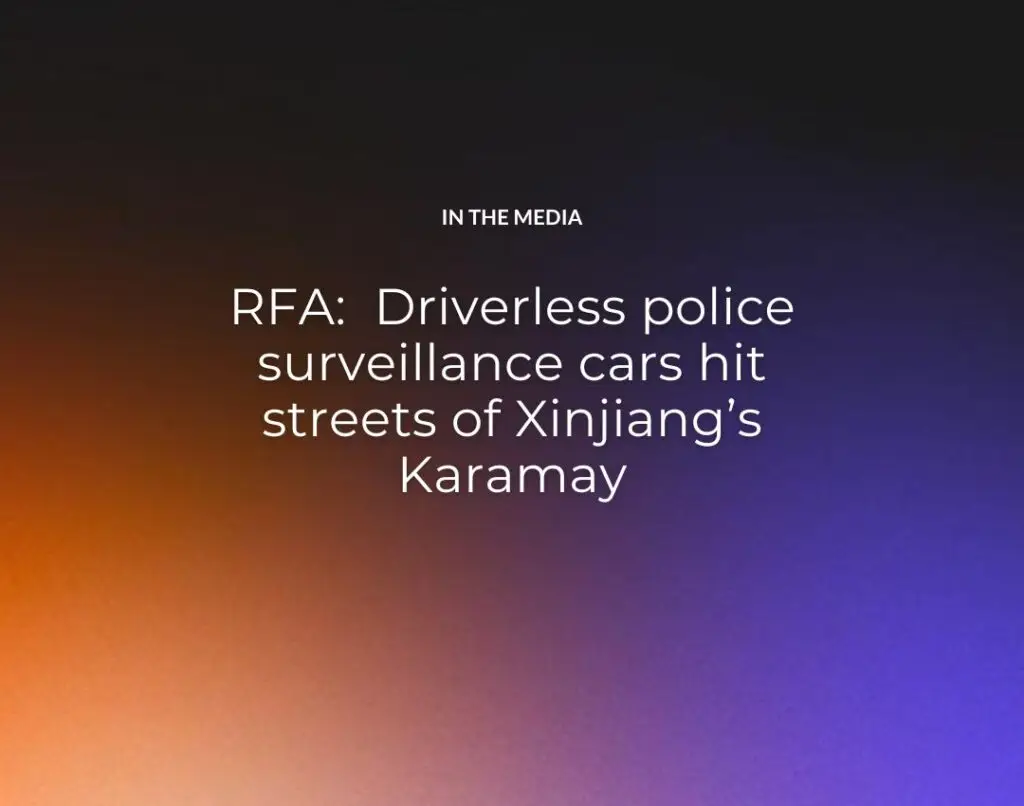Critics say the cars represent another threat to the rights of Uyghurs in the region, experts say.
By Gulchehra Hoja
RFA Uyghur
July 14, 2022

China has introduced a new method of surveillance in the Xinjiang Uyghur Autonomous Region: 20 driverless electric patrol vehicles.
China began testing its first domestically manufactured high-tech patrol car in Karamay (in Chinese, Kelemayi), an oil-rich city in the northern part of the region. The self-driving patrol car was first launched there in February with five cars, though the fleet has since been expanded to 20, state-owned news agency Xinhua reported on June 29.
Zhao Wenchuan, the secretary for the city’s Chinese Communist Party Committee, has said Karamay was chosen as the production and testing base for the smart patrol vehicles because it is the leading digital city in the region.
The unmanned surveillance patrol vehicles are expected to be deployed throughout Xinjiang, according to Chinese media reports.
The cars, dubbed the “Little Patrol,” are manufactured by Zhongke Tianji (Xinjiang) Aerospace Information Co., Ltd., according to a March 30 report by the Karamay Daily.
The vehicles are patrolling the city’s main shopping centers, tourist spots and some residential communities 24 hours a day, Zhao Guoxin, head of the Karamay municipal police bureau, told Xinhua.
The cars are being used to plug holes in areas that lack surveillance cameras and work in concert with the police officers, drones and other video systems, he said.
When RFA contacted the municipal police bureau for information about the vehicles, a person forwarded the call to the Qurum (Kunlun) Road Police Station out of which the self-driving electric patrol cars operate.
“This is the first time a driverless patrol car has been tested. When we remotely control its antenna at our station, it goes on patrolling itself,” a Chinese police officer who did not provide a name told RFA.
“It has radar installed. If there is an accident or it is interrupted or the police report a signal, it can send a signal to us through that radar,” he said.
The driverless patrol cars are equipped with eight surveillance cameras that can rotate 360 degrees, the police officer said before the call abruptly ended.
They also have more than 20 types of special features, including anti-collision sensors, according to a report on Tengritagh (Tianshan), the official website of the Xinjiang government. The vehicles collect data and deliver it “with high efficiency,” the website states.
The smart patrol cars are also equipped with facial recognition and tracking technology to collect data on suspicious incidents to send to the Integrated Joint Operation Platform, the main system for mass surveillance in Xinjiang.
“Its other advantage is that this car can replace one to three police officers and perform a full-time, 24-hour patrol,” the report said.
The launch of the “Little Patrol” has heightened intelligence gathering as it also has reduced spending on police officers, the chief of the Qurum Road police station told reporters in the Karamay Daily article.
Zhang Feng, technical director of Zhongke Tianji, told the newspaper the driverless surveillance cars were first tested in Karamay because the city has excellent data processing capabilities. A smart patrol car manufacturing plant is also located there.
“This is the first time a driverless intelligent police patrol vehicle has been used in Xinjiang. After the pilot project in Karamay, these cars will be rolled out across Xinjiang,” Zhang Feng was quoted as saying.
‘Scaring the people’
Experts on China’s policies in Xinjiang expressed concern about the introduction of self-driving surveillance cars.
“This is just the next step in setting up that perfect police state, ensuring that the police have total power,” said Geoffrey Cain, a U.S. journalist who wrote the book The Perfect Police State: An Undercover Odyssey into China’s Terrifying Surveillance Dystopia of the Future.
While China’s use of surveillance technology in the XUAR is nothing new, the use of the autonomous police vehicles are meant as another warning to local residents, he said.
“The Chinese government likes to pretend that it is the master of technology, that it has all the best technology, but what it’s really doing is scaring the people,” Can told RFA. “It’s scaring the Uyghur people by making it look like the technology is sophisticated when the equipment is quite basic and elementary.
“It’s more like the perception or the idea that the [government] is always watching that makes people scared. It’s just that they don’t realize when or where they’re being watched,” he said.
Maya Wang, senior researcher at Human Rights Watch, said the Chinese government’s use of driverless patrol vehicles in Karamay is a continuation of its efforts to enhance and expand the police surveillance system in the XUAR.
“The deployment of these cars certainly is part of that intensive investment in policing, surveillance and repression in the region,” she said.
“The violation of the right to privacy has knock-on effects on almost every single right — the right to practice religion, the right to freely express yourself, the right to associate and assemble. Those are fundamental rights that Uyghurs and residents of Xinjiang are deprived of because these systems essentially create an all-seeing system that makes the exercising of these rights impossible,” Wang said.
Zhongke Tianji said it plans to produce 3,000 smart cars.
Read the original RFA post here.
See Also:






